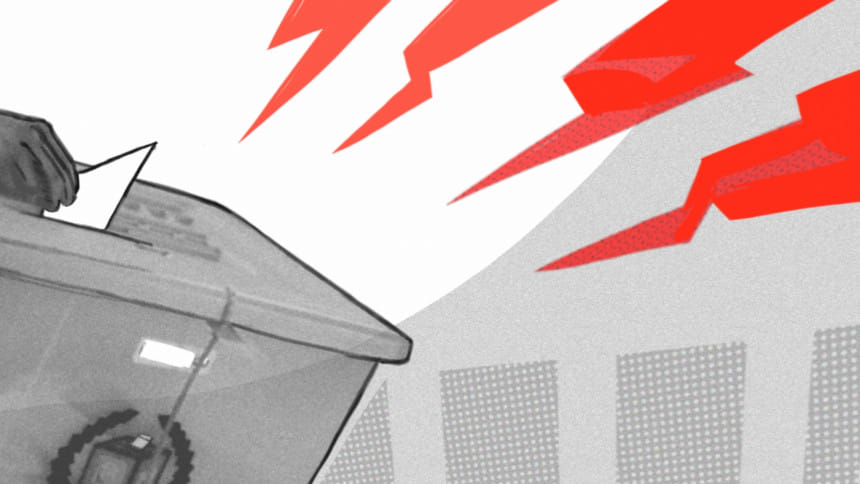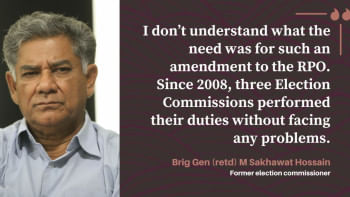Why is the EC unable to do its due diligence?

By now, most of us know the term "gayebi mamla" which is used to describe fake or fictitious cases filed against opposition activists, including leading politicians. For nearly a decade, police have been using this tactic to deter activists taking part in anti-government politics by lodging false cases for incidents of violence, use of explosives, and so on. Subsequent media investigation usually reveals that no such incident ever took place at the given date, time, and place. There are a number of reported cases in which the accused included people who died years ago, or were living in another country when the alleged incident happened.
Now, our Election Commission seems to be following a similar path. It has selected some organisations for the purpose of election observation which exist only on paper. A recent investigation by Prothom Alo has revealed that a number of those organisations stopped functioning years ago. Its investigation into 32 out of the 68 organisations selected by the EC as being fit for poll monitoring found that seven of them exist only on paper. Moreover, members of the board of directors or their close relatives in at least 10 other organisations reportedly have political affiliations.
Earlier, on July 27, Bangla daily Jugantor reported that on the list of 94 organisations prepared by the EC for election monitoring, there were many that were floated and led by political activists. The recently published primary list of 68 selections suggests that many of the 94 "political monitors" have been dropped. But latest reports also prove that the screening process has largely failed. Investigations by the media found that most of these organisations do not have adequate human resources, thereby raising questions about their ability of conducting impartial monitoring of the national polls.
According to Prothom Alo, Seba Social Foundation of Laxmipur district has been selected as an election monitor despite the fact that its lone functionary, executive director Jashim Uddin Ripon, has been living in Saudi Arabia for five years, and the organisation has been dormant for just as long. It is even more intriguing to know that the local police had reported all this to the EC following their inquiry, but their finding seems to have been overlooked.
The two previously unknown political parties – Bangladesh Nationalist Movement (BNM) and Bangladesh Supreme Party (BSP) – have received the EC's approval despite the media's field-level investigations finding that both of these suddenly created parties do not fulfil the required conditionalities, including having a minimum grassroots organisation and appropriate party offices or headquarters. Why have these media reports been largely ignored?
One may recall the EC's largely discredited meeting with a group of so-called multinational observers brought in by the now-disqualified Election Monitoring Forum (EMF), which was apparently set up by the close associates of some politicians belonging to the ruling party. Responding to the controversies, Election Commissioner Md Alamgir told the media on August 2 that, as the EC didn't have offices overseas, it was not possible for them to detect the inauthenticity of the foreign observers.
EC Alamgir's clarification, however, falls far short of being convincing, as their primary responsibility was to ascertain the locus standi of the foreign observers in order to bring them in. Besides, the EC should have known that the EMF didn't have any recognition as an observer group. Sure, the chief of the EMF had earlier represented a separate organisation called the Saarc Human Rights Foundation (SHRF). But the SHRF's tenure as a poll observer, too, expired last May after five years. The EC's attempt to justify its lack of due diligence in dealing with the issue of poll observation is simply shocking. It even failed to express any regret for wasting the valuable hours of the Commission and its resources, however little that may have been. Interestingly, the EC does not deserve much credit for the removal of the EMF, as the lone member organisation of this forum, Bibi Asiya Foundation, has succeeded in securing a place in the new list of election observers.
It is not only the issue of dealing with election observers that has caused controversy. The registration of political parties, too, has given rise to serious questions about the EC's fairness and motivations. The two previously unknown political parties – Bangladesh Nationalist Movement (BNM) and Bangladesh Supreme Party (BSP) – have received the EC's approval despite the media's field-level investigations finding that both of these suddenly created parties do not fulfil the required conditionalities, including having a minimum grassroots organisation and appropriate party offices or headquarters. Why have these media reports been largely ignored?
Certain quarters' interests in propping up these two parties are quite evident, as people familiar with their activities have suggested that fresh initiatives are in full steam to attract leaders and activists from BNP – people who have been sidelined in the party for some time – to the new parties. There are widespread speculations that in the case of a BNP boycott in the upcoming parliamentary election, one of these two parties will get all the support required to replace BNP and make the contest a "participatory" one.
Ignoring evidence appearing in the media runs contrary to the legal requirements in terms of both the registration of political parties and selecting impartial and genuine election observers. And this indicates a disturbing trend. These deviations not only erode the EC's credibility but also strengthen their critics' argument that the Commission has neither independence nor the ability to fulfil its obligations with due diligence.
Kamal Ahmed is an independent journalist. His X handle is @ahmedka1

 For all latest news, follow The Daily Star's Google News channel.
For all latest news, follow The Daily Star's Google News channel. 










Comments